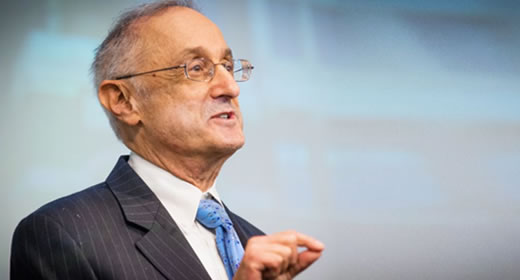
This April, Bob Axelrod was invited to attend a closed-door workshop at Oxford University's Centre for the Resolution of Intractable Conflict. The focus: The 2015 nuclear deal with Iran.
One year ago, the U.S. and other powerful nations forged an innovative accord with Iran. Fearing the nation had acquired nearly enough enriched uranium to make a bomb, they agreed to support the lifting of United Nations sanctions if Iranian leaders acted quickly to surrender their enriched uranium, to dismantle their centrifuges, to decommission their heavy water reactor, and to open their nuclear energy facilities to international inspectors.
Twelve months later, Iran has met its obligations, and the United Nations has lifted economic sanctions.
Axelrod and others who are knowledgeable about the Middle East see the accord as an inventive, peaceful solution.
"The Iranian nuclear deal made it possible for Iran to continue its peaceful nuclear program while at the same time assuring others that Iran was not capable of making a nuclear weapon, or that if it did so, that it would be spotted in time," says Axelrod.
But the Iranian nuclear deal remains fragile and contentious. Some Middle East observers believe that Iran remains a threat, and that sanctions should be reinstated. President-elect Donald Trump has threatened to dismantle the deal when he takes office. The accord, Axelrod says, is under threat.
At the April workshop, which attracted a number of scholars, policymakers, and activists from Iran, Israel, and Saudi Arabia (abiding by Oxford's Chatham House Rules, Axelrod can't share their names or affiliations), Axelrod spoke about "spoilers"—those parties who might wish to undermine the deal by spreading misinformation.
"In any deal," says Axelrod, "there will be people who would like it to not work." For an analogy, he points to the Oslo peace accords. A landmark agreement between Israel and the Palestinian Authority, the accords fell apart, he says, when Hamas began conducting terror attacks that frightened the Israelis.
In the case of the Iranian nuclear deal, Axelrod warns that mutual distrust creates and perpetuates an atmosphere of fear, which makes it easier for anyone seeking to derail a fragile agreement.
His advice to both sides? Be wary of potential spoilers; be transparent, which builds trust; and avoid provocation.
Economic conditions are a problem, too, he says.
Conditions for Iranian citizens—who have suffered high rates of unemployment and poverty in recent years—need to improve visibly. If they don't, public support for the deal will erode.
"Hopefully, President-elect Trump will rethink his opposition to the treaty once he takes into account that it's the only way to prevent Iran from getting nuclear weapons."
Unfortunately, says Axelrod, European banks and firms have been hesitant to invest because they're "uncertain about what would constitute a violation of the remaining U.S. sanctions against state-sponsored terrorism and the Iranian ballistic missile program."
"The apparent lack of enthusiasm from many financial institutions to invest and trade with Iran may be due to understandable caution about running afoul of the remaining U.S. sanctions," he continues, "but the Iranians themselves may attribute the caution to deliberate foot-dragging by leading foreign powers that offered the promise of economic growth."
Below is a formatted version of this article from State & Hill, the magazine of the Ford School. View the entire Fall 2016 State & Hill here.
More news from the Ford School